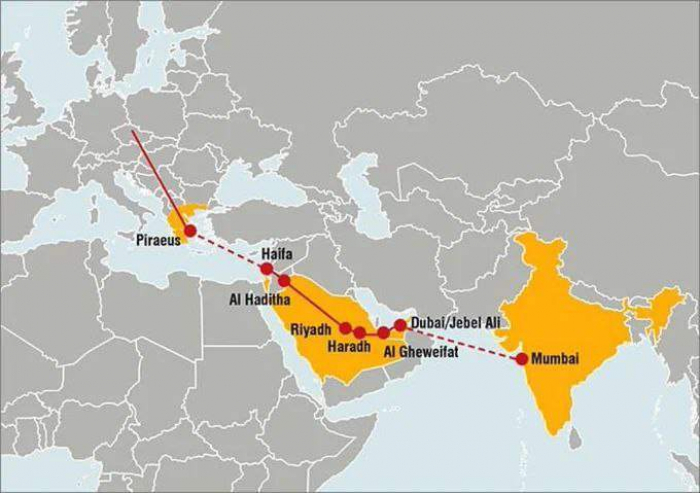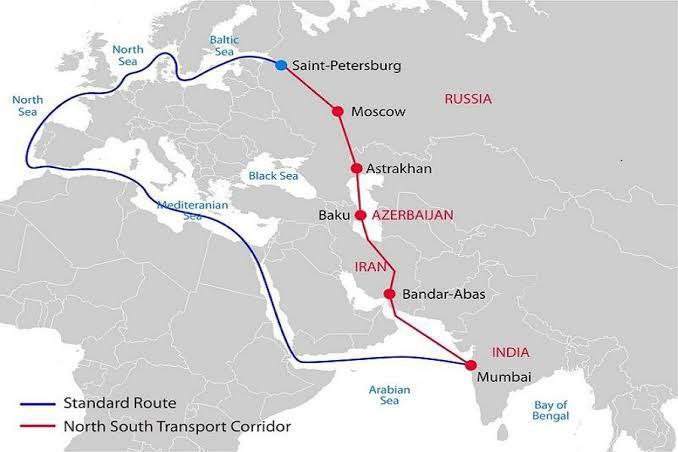13.09.23 10:30

One of the key outcomes of the G20 summit in New Delhi, India, was that India, the United States, Saudi Arabia and the European Union agreed to create a transport and economic corridor linking India with countries in the Middle East and Europe.
The project includes the construction of a railway network and the development of port infrastructure. The aim is to increase the capacity of export and transit routes. The parties have signed a Memorandum of Understanding.
The project envisages the following corridor: from India by sea to the UAE, then from the UAE by land through Saudi Arabia, Jordan and Israel, then by sea to Greece and from there by land to other EU countries. US President Joe Biden has already expressed his support for the project.
Turkish President Recep Tayyip Erdogan opposed this infrastructure plan to link India, the Middle East and Europe by sea and rail, which was unveiled at the G20 summit. But he proposed another route that is far more economically viable: "Without Turkey, there is no such corridor," Erdogan said, proposing a rival plan to link the Persian Gulf to Turkey via Iraq, which he called the "Road Development Project". In principle, rerouting transit from India via Iraq to Turkey would require an order of magnitude less investment. If only because the transport and logistics infrastructure already exists on this route - both a major port in Basra and a railway linking Basra to Europe via Iraq and Turkey.
If we delve into history, we can see that this is the same famous Baghdad Railway that was built in the early 20th century, connecting Berlin and Basra via Istanbul and Baghdad. The question of the functioning of this railway was one of the reasons for the First World War. After all, this railway gave Germany, a contender for world supremacy in the early 20th century, a link to the Indian Ocean and access to India, something that Great Britain, which owned India at the time, desperately opposed.
The position of the United Kingdom (whose government is led by an Indian) and its "preference" have not yet been openly stated. Although both corridors (via Iraq and Saudi Arabia) bypass the Egyptian-controlled Suez Canal. Meanwhile, both Egypt and Iran have recently been geopolitically aligning themselves more and more with another "sworn friend" of the UK - France. Britain - France. In the First World War, France was Britain's ally and one of the victors, but it did not get control of the routes to the Indian Ocean. It did not even get the Iraqi Mosul, which was initially promised to it and which allowed it to control a "piece" of the Baghdad railway.
It should be understood that the main "trick" of both the new corridor through the UAE, Saudi Arabia, Jordan, Israel and Greece and the corridor through Iraq and Turkey is the complete exclusion of both Russia and Iran.
India has changed the route for its goods to Europe to compete with China. It excluded Russia and Iran. Meanwhile, it was Iran that recently hoped to take over the main transit flow between India and the EU.

But the main weakness of the corridor through Iran was the almost maniacal desire of the regime in Tehran to 'bypass' Azerbaijan and Turkey. Therefore, instead of completing the Resht-Astara railway as soon as possible and thus getting the opportunity to transport goods from the Indian Ocean basin via Azerbaijan to Russia, via Azerbaijan and Georgia to the Black Sea basin, or via Baku-Tbilisi-Kars to Turkey and on to Europe, Iran tried to include Armenia, which is "friendly" to it but hostile to its neighbours, in the corridor.
Not to mention the fact that even before the construction of the Resht-Astara railway, Iran could have a direct rail link with Azerbaijan - as a result of the opening of the Zangezur corridor and its rail component through Meghri. But it is the opening of the Zangezur corridor that Iran is most opposed to. As a result of its intrigues, following the example of its Armenian "friends", Iran has simply lost time.
The world economy cannot wait for Tehran and Yerevan to weave their intrigues. That is why it has already been decided that the India-Europe transport corridor will bypass Iran.
But instead of trying to reach a good agreement with its neighbours and opening transit routes through Azerbaijan as soon as possible, Iran is resorting to a policy of blackmail, support for Armenian revanchists and demonstrative military threats against Azerbaijan, which could be Tehran's optimal partner in international transit. This further alienates Iran's prospects of participating in the transit between India and Europe. International business is simply not going to build logistics through a country that could go to war with its neighbours at any moment.
Grigol Giorgadze
Read: 631
Write comment
(In their comments, readers should avoid expressing religious, racial and national discrimination, not use offensive and derogatory expressions, as well as appeals that are contrary to the law)
News feed
-
Georgian Parliament holds yellow security level
12:0903.05.24
-
18:0002.05.24
-
Georgian Parliament Speaker, EU official review cooperation, integration
17:3202.05.24
-
US State Department condemns foreign influence bill advanced in Georgian Parliament
16:4002.05.24
-
Georgian Economy, Finance Minister review cooperation, projects with World Bank Executive Director
16:0002.05.24
-
15:0502.05.24
-
14:2902.05.24
-
13:5202.05.24
-
Austrian Airlines launches Vienna-Tbilisi flights
13:0002.05.24
-
12:1002.05.24
-
Health Ministry: Eight hospitalized during protest, patients' health conditions are satisfactory
11:2202.05.24
-
Ursula von der Leyen: Georgian people want European future for their country
10:1602.05.24
-
Is Echmiadzin opposed to peace in the South Caucasus? Once again...
18:5701.05.24
-
Georgian Parliament official highlights “threats” of external interference among “European public”
18:0001.05.24
-
17:0801.05.24
-
16:2701.05.24
-
15:2701.05.24
-
Josep Borrell Responds To The Situation In Georgia
14:4301.05.24
-
Tbilisi Mayor says Europe needs worthy, strong states
14:0001.05.24
-
Georgia imported 265 tons of lentils in January-March
13:3101.05.24
-
12:5001.05.24
-
12:0501.05.24
-
11:3101.05.24
-
10:5001.05.24
-
Yellow level of security regime to be again in effect in Parliament today
10:1601.05.24
-
Armenians in the Ottoman Empire: What Was, What Could Have Been and Today's Reality
7:5501.05.24
-
18:0530.04.24
-
Vice-President of the European Commission: I advised Ilia Darchiashvili to review our directive
17:1030.04.24
-
The Parliament elected Giorgi Kalandarishvili to the post of CEC Chairman
16:1530.04.24
-
15:4030.04.24
-
According to the government's decree, May 7, 8, and 10 were declared public holidays
13:5930.04.24
-
13:2130.04.24
-
Geostat: Georgia's economy grew by 8.2% in March
12:5030.04.24
-
President: Today, some people want to portray our 30-year-old allies and partners
12:0530.04.24
-
Georgian PM says “no alternative” to opening EU accession talks with country this year
11:3230.04.24
-
Ruling party Honorary Chair says “majority” of public “firmly support” NGO “transparency”
10:5130.04.24


